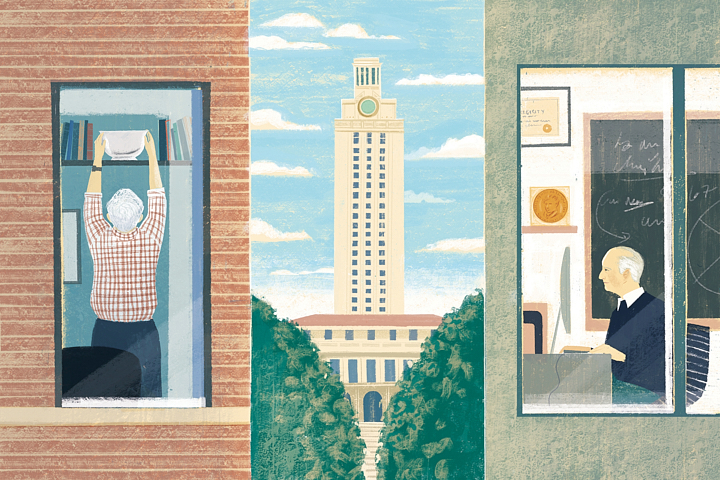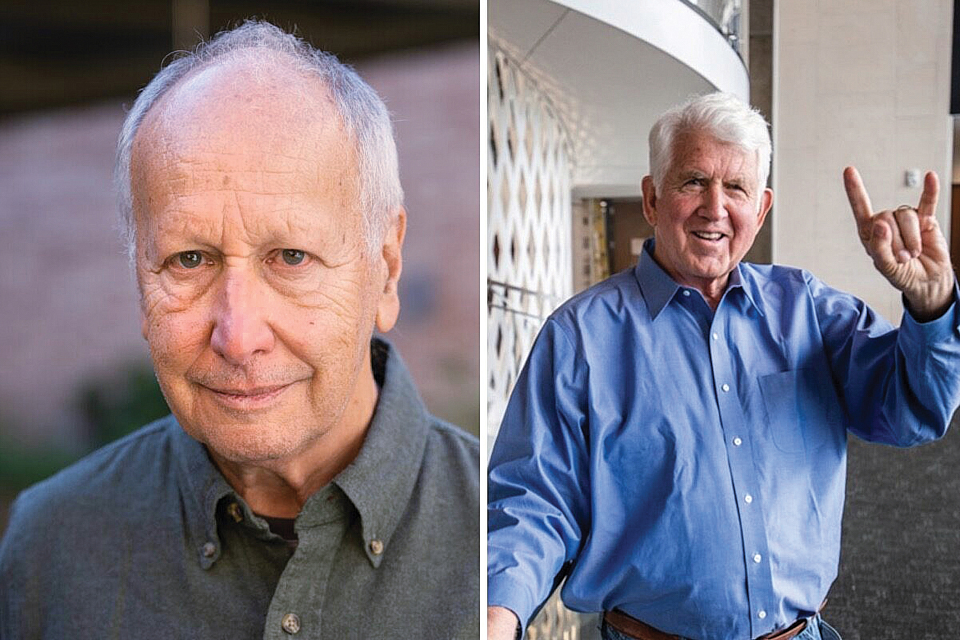Two UT Austin Professors Snag the ‘Nobel Prizes’ of Their Fields
By Marc Airhart and Nat Levy

Winning a Nobel Prize brings unmistakable cachet, but for many of the sciences—essentially anything outside of chemistry, medicine, physiology, or physics—the top prize in a field goes by some other name. In math, it’s called the Abel Prize. In computer science, it’s the Turing Award. And early one morning in March, two University of Texas at Austin faculty members each woke up to extensive profiles about them and their work published in The New York Times for having won one of these top prizes.
Professor Luis Caffarelli was announced as the winner of the Abel Prize, given by the Norwegian Academy of Sciences and Letters and considered the “Nobel of mathematics,” just hours after electrical and computer engineering professor emeritus Bob Metcalfe was named the latest winner of the Turing Award, widely considered the “Nobel Prize of computing” and given by the Association of Computing Machinery. UT Austin is the only university in the world to have won both prizes in the same year. It’s also the only university to have now racked up three winners for each of these prizes.
“On behalf of the university, I extend our heartfelt congratulations to Professor Caffarelli and Professor Metcalfe on these tremendous honors, which exemplify the impact and excellence of our research and teaching missions,” UT President Jay Hartzell, PhD ’98, Life Member, says. “Not only have these world-renowned researchers made profound, global contributions to their respective fields, they have brought their knowledge and experience into the classroom to inspire and remind our students that they have the potential to make the same impact on society.”

Fewer than two dozen institutions worldwide can claim even one Abel Prize laureate. But the Abel Prize has gone to three UT Austin mathematicians since it was first awarded in 2003. Late professor emeritus John Tate received the award in 2010, professor emerita Karen Uhlenbeck was the first woman to win the award in 2019, and this year Caffarelli became the first person of Latin American origin to win the prize. Caffarelli, who holds the Sid W. Richardson Foundation Regents Chair in Mathematics #1 in UT’s Department of Mathematics, joins the ranks of well-known mathematicians who have won the award before him, such as John Nash, the subject of the film A Beautiful Mind and Andrew Wiles, who proved Fermat’s Last Theorem. He received the award from King Harald V of Norway on an award ceremony stage in Oslo in May—a prize that comes with 7.5 million Norwegian kroner (about $710,000).
The cash prize for the A.M. Turing Award is even larger, as it includes a $1 million prize, with financial support provided by Google. The award is named for Alan M. Turing, the British mathematician who articulated the mathematical foundations of computing. Metcalfe is UT’s third Turing Award winner, after late professor emeritus Edsger Dijkstra received the award in 1972 and professor emeritus E. Allen Emerson received it in 2007.
Metcalfe received the honor for his invention, standardization and commercialization of Ethernet. Today, Ethernet is the main conduit of wired network communications around the world.
“It is dangerous to accept an award for developing Ethernet, which turned 50 on May 22, 2023,” Metcalfe says. “Over Ethernet’s 50 years, hundreds of people have earned some claim of inventorship. Join me in saying to these folks, ‘Thank you.’”
During his 10 years at UT in what today is the Chandra Family Department of Electrical and Computer Engineering, Metcalfe was a fixture as a speaker and advisor for entrepreneurial groups and events across campus. He was a major part of Longhorn Startup, a fall course that gives students an opportunity to hear from entrepreneurs and then pitch their own projects. And he created a startup studio and salons within the Cockrell School to help professors and students sharpen their innovation ideas.
“Bob has made several important contributions to the tech industry. His invention of Ethernet revolutionized how everyone interacts with computers and each other,” Roger Bonnecaze, Dean of the Cockrell School of Engineering, says.
Colleagues of Caffarelli say the mathematician’s impact is equally important for everyday modeling and understanding of complex systems and phenomena in the world. One of Caffarelli’s first breakthroughs was creating a mathematical solution describing the smoothness of ice melting into water and his accomplishments in mathematical physics include partially defining the regularity of the motion of fluids. As fellow UT math professor Francesco Maggi explains, Caffarelli’s work both solves real-world problems and goes beyond problem-solving, opening completely new directions for others in the field.
“I think that Luis’ impact has been made even greater by his legendary kindness and generosity, which have made him one of the most beloved members of the international mathematical community,” Maggi says.
Raised and educated in Argentina, Caffarelli has been referred to in the press as “the Messi of math,” a nickname after the soccer player Lionel Messi, who also brought home a World Cup win for that country this year.
“I am very humbled by the Abel Prize selection committee and the unwavering support of my collaborators through my 50 years of work,” Caffarelli says. “We mathematicians begin our careers following the paths of those who have contributed to paramount scientific advancements. I have truly enjoyed every moment of my mathematical career. My career and collaborations have been a constant source of joy and inspiration.”
Dean of the College of Natural Sciences David Vanden Bout, PhD ’95, has interacted with both Caffarelli and Metcalfe and points out that it is not just in research where the pair have made a real difference at UT.
“These two individuals are both amazing teachers and amazing mentors,” he told KXAN on the day of the announcements. “We have people who have made incredible impact through their research and scholarship, but they’ve also made an incredible impact through the people who they’ve trained in their disciplines.”
CREDITS: Illustration by Sam Kalda; Courtesy of Nolan Zunk





